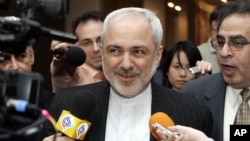UNITED NATIONS —
Iranian Foreign Minister Mohammad Javad Zarif will meet U.S. Secretary of State John Kerry when he joins the five permanent U.N. Security Council members and Germany later this week to discuss the crisis over Iran's nuclear program.
The meeting, scheduled for Thursday, would be the highest level diplomatic encounter between Washington and Tehran in at least six years. The two countries broke relations more than three decades ago.
The announcement comes after European Union foreign policy chief Catherine Ashton said she had a "constructive discussion" with Zarif and his British and French counterparts ahead of this week's U.N. General Assembly session in New York.
Ashton says Iranian Foreign Minister Mohammad Javad Zarif will "have a short discussion" on Iran's nuclear program with the United States, Russia, Britain, France, China, and Germany.
She says Iranian and European Union teams agreed to meet in Geneva in October to continue efforts to limit Iran's nuclear program.
September 4: President Hassan Rouhani tweets “As the sun is about to set here in Tehran I wish all Jews, especially Iranian Jews, a blessed Rosh Hashanah.”
September 18: Iran releases 11 prominent political prisoners, including human rights lawyer Nasrin Sotoudeh.
September 18: In an NBC interview, Rouhani says Iran would under no circumstances seek any weapons of mass destruction, including nuclear weapons.
September 20: Rouhani writes an opinion piece in The Washington Post advocating the use of constructive dialogue to solve global problems.
Tehran says its atomic activities are for peaceful civilian purposes. The permanent members of the U.N. Security Council believe Iran may be working to develop nuclear weapons.
Ashton told reporters at the United Nations that she and Zarif had a "good and constructive discussion" ahead of the opening of the annual General Assembly.
"What I saw today was energy and determination to try and move forward in our talks. Many things flow from that," said Ashton.
The election of a new government in Tehran may be an opening for progress on nuclear talks as responsibility for that diplomatic effort has been shifted from the Iranian military to the Iranian foreign ministry.
The new president, Hassan Rouhani, makes his first appearance at the United Nations Tuesday. Ahead of that speech, President Rouhani recently told NBC News that Iran will never develop nuclear weapons and wants "the swiftest resolution of this issue in the framework of international standards."
The meeting, scheduled for Thursday, would be the highest level diplomatic encounter between Washington and Tehran in at least six years. The two countries broke relations more than three decades ago.
The announcement comes after European Union foreign policy chief Catherine Ashton said she had a "constructive discussion" with Zarif and his British and French counterparts ahead of this week's U.N. General Assembly session in New York.
Ashton says Iranian Foreign Minister Mohammad Javad Zarif will "have a short discussion" on Iran's nuclear program with the United States, Russia, Britain, France, China, and Germany.
She says Iranian and European Union teams agreed to meet in Geneva in October to continue efforts to limit Iran's nuclear program.
Recent Overtures from Iran
Recent Overtures from IranSeptember 4: President Hassan Rouhani tweets “As the sun is about to set here in Tehran I wish all Jews, especially Iranian Jews, a blessed Rosh Hashanah.”
September 18: Iran releases 11 prominent political prisoners, including human rights lawyer Nasrin Sotoudeh.
September 18: In an NBC interview, Rouhani says Iran would under no circumstances seek any weapons of mass destruction, including nuclear weapons.
September 20: Rouhani writes an opinion piece in The Washington Post advocating the use of constructive dialogue to solve global problems.
Ashton told reporters at the United Nations that she and Zarif had a "good and constructive discussion" ahead of the opening of the annual General Assembly.
"What I saw today was energy and determination to try and move forward in our talks. Many things flow from that," said Ashton.
The election of a new government in Tehran may be an opening for progress on nuclear talks as responsibility for that diplomatic effort has been shifted from the Iranian military to the Iranian foreign ministry.
The new president, Hassan Rouhani, makes his first appearance at the United Nations Tuesday. Ahead of that speech, President Rouhani recently told NBC News that Iran will never develop nuclear weapons and wants "the swiftest resolution of this issue in the framework of international standards."











